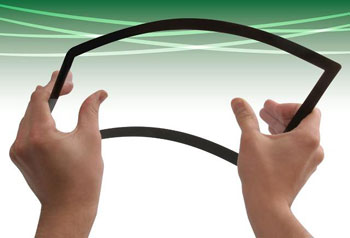 Santa Paula, CA – Abrisa Technologies chemically strengthens thin glass per ASTM 1422 and tests per ASTM C 158. This process does not affect the optical quality of the glass, making it an ideal solution for display panel and touch screen applications. The chemical strengthening process can make the glass up to 8 times stronger than annealed float glass.
Santa Paula, CA – Abrisa Technologies chemically strengthens thin glass per ASTM 1422 and tests per ASTM C 158. This process does not affect the optical quality of the glass, making it an ideal solution for display panel and touch screen applications. The chemical strengthening process can make the glass up to 8 times stronger than annealed float glass.
This strengthening process is done via an ion-exchange surface treatment, and works well for strengthening soda-lime or other thin glass material with a high sodium oxide content and a thickness of less than 3 mm. Abrisa Technologies has the capability to chemically strengthen glass in sizes up to 46″ x 29″.
Chemically strengthened thin glass by Abrisa Technologies, improves transmission, reduces weight, and may also reduce mounting costs, while also providing improved impact resistance, scratch and abrasion resistance, and increased bending strength and temperature stability.
The chemical bath process causes the surface of the glass to be in a state of compression and the core in compensating tension improving the tensile strength of the glass. The end result of chemical strengthening is glass that has little or no bow, warp, optical distortion, or strain pattern.
Optical clarity is of prime importance for display panel and touch screen applications; consequently chemically strengthened glass is used versus heat tempered glass. Glass that has been chemically strengthened by Abrisa Technologies is well-suited for optical bonding, protective covers, viewports, and front surface optics in hostile environments including high temperatures, high pressure, and vacuum situations.